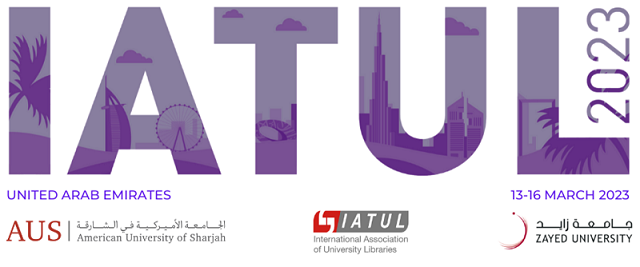
IATUL 2023 Slides
Type
Presentation
Abstract
The expected abilities of the ‘literate’ have altered within the Information Age with reliance on digital technology (Stordy, 2015). Information literacy is described as the practical real world application of critical thinking skills within the domain of information (Doyle, 1994). Digital literacy can be considered as the ability to navigate and utilise the internet and digital tools to accomplish personal, professional, and civic goals (Martzoukou et al., 2020). Information literacy and digital literacy, both with foundations of critical thinking and collaboration within digital settings, have been reframed and incorporated (along with other literacies including media literacy, computer literacy, and visual literacy) into the overarching term of ‘metaliteracy' (Mackey & Jacobson, 2014).
Higher Education institutes have responsibilities prepare students for future professional employment (Ross et al., 2016), encouraging competences and skills at the core of effective and ethical citizenship (Tejedor et al., 2020). Metaliteracies are composed of numerous and broad-ranging applied knowledge practices that encompass critical analysis, finding, synthesising, and managing information (Association of College & Research Libraries, 2016) within digital environments (Stordy, 2015). The numerous and broad-ranging skills are transdisciplinary and appropriate for co-curricular education (Ching & New, 2020). Middlesex University Dubai librarians designed and developed Library Focus workshops as a co-curricular generic intervention for foundation, undergraduate, and postgraduate students. During the pandemic the Library Focus co-curricular workshops were shifted online. Virtual workshops provided both opportunities and barriers for student participation with voluntary instruction intended to improve student skills. After the move to online there was substantial growth in workshop registrations and attendance that could initially indicate increased student engagement and motivation. During the workshops, apparent barriers include technical issues, and lack of interaction with teachers during the workshop (Coman et al., 2020).
This explorative study probes students’ motivation and experiences through 14 qualitative interviews. The research explores: students' motivation to attend co-curricular metaliteracy workshops; students’ perceptions and experiences of the learning environment created within the online workshop; the efficacy of generic workshops to satisfy a diverse range of students; and proposed future strategies to encourage student attendance and improve the teaching-learning environment experienced.
Publication Date
3-14-2023
Conference Name
IATUL 2023: 43rd International Association of University Libraries Annual Conference. Dubai & Sharjah, United Arab Emirates (March 13-16, 2023)
Disciplines
Library and Information Science
Keywords
University students, Information Literacy, Metaliteracies, Co-curricular workshops, Online learning
Recommended Citation
Barber, Laura Dee and Cruz, Abigail, "Exploring student engagement on co-curricular metaliteracy workshops during the Covid-19 pandemic and afterwards" (2023). IATUL 2023 Slides. 4.
https://zuscholars.zu.ac.ae/iatul2023/4
Creative Commons License

This work is licensed under a Creative Commons Attribution 4.0 International License.

